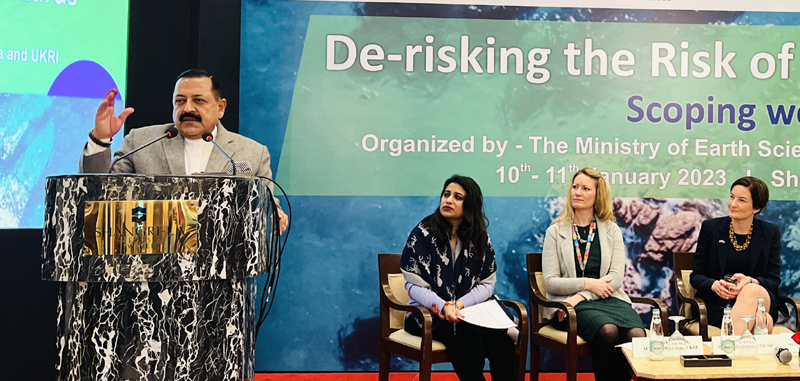
Excelsior Correspondent
NEW DELHI, Jan 10 : While inaugurating the 2-day Indo-UK Workshop on “Earth Hazards” here today, Union Minister of State (Independent Charge) Science & Technology; Minister of State (Independent Charge) Earth Sciences; MoS PMO, Personnel, Public Grievances, Pensions, Atomic Energy and Space, Dr Jitendra Singh stressed the need to devise mitigation strategies to minimise human consequences of natural disasters.
The British Delegation at the Workshop is led by Christina Scott, the Minister and Deputy High Commissioner to India. She is accompanied by Wendy Matcham, Head, Natural Environment Research Council (NERC), UK Research and Innovation (UKRI), while from the Indian side, Dr. M. Ravichandran, Secretary, Ministry of Earth Sciences, Dr. O. P. Mishra, Director, National Center for Seismology, Ministry of Earth Sciences and Sukanya Kumar, Acting Director, UK Research and Innovation India took part in the deliberations.
It is a providential coincidence, said Dr Jitendra Singh that the Joint Geoscience Workshop on “Earth Hazards” is happening at a time when India is dealing with Joshimath incident in Uttarakhand, where the Ministry of Earth Sciences is involved in addressing the issue along with other agencies.
Dr Jitendra Singh said, taking a cue from Prime Minister Narendra Modi, the Ministry of Earth Sciences has adopted Proactive stance and established 37 New Seismological Centers( Observatories) in the last two years and now India has 152 such centers for extensive observation facilities generating huge data base for outcome-oriented analytics. He informed that in next 5 years, 100 more such seismological centers will be opened across the country for improving the real time data monitoring and data collection. India is moving closer to playing a critical role in seismological advancement and understanding, the Minister added.
Dr Jitendra Singh underlined that there is a critical need for fundamental research on the physical processes that lead to failure of the brittle layers beneath the crust and sub-crust, to develop low-cost solutions to identify and quantify the geo-hazards over the vast regions and devise mitigation strategies that are appropriate to widely varying – and rapidly evolving – political, social, and economic contexts. He also added that scientific understanding of the processes behind disasters has grown immensely over the past 50 years, and there is need for strengthening further international collaborations like the Indo-UK initiative to fight such disasters in future.
The Minister underlined that deep collaboration of Indian scientists with UKRI counterparts on Solid Earth Hazards will enrich our understanding to further develop a way out for mitigating the risk associated with natural disasters like earthquakes, landslides, and tsunami, etc.
Christina Scott in her remarks said that building resilience to geo-hazards presents a major challenge that requires collaborative international action by researchers, policymakers, governments, private sectors, and civil societies. He said, in this context, the UK earth scientists may significantly contribute to the current understanding of tectonic activity and its relation to geo-hazards in India. The outcome of the workshop will lead to specific scientific problems much relevant to society that would jointly be studied with UK counterparts to understand the challenges faced by India, Scott added.
Dr M. Ravichandra said that this joint workshop is a fitting environment for both the countries to shake hand and forward research in their niche as well as pursue new avenues of multi-disciplinary investigations. He said, it will indeed provide an opportunity to the experts/academicians from India and UK to come together and discuss the critical need for fundamental research in different aspects of Solid Earth Hazards for the Indian region.
Wendy Matcham, Head, Natural Environment Research Council (NERC), UK Research and Innovation (UKRI) said in her remarks that the aim of this workshop is to scope the potential areas of focus of research between UK and India. She said, it would be noteworthy to mention that UKRI has already engaged them in a similar kind of collaboration on activities of MoES related to atmospheric science and hydrological science.
The Ministry of Earth Sciences (MoES) has constituted a team of scientists representing National Center for Seismology (NCS) New Delhi, Borehole Geophysical Research Laboratory (BGRL) Karad, National Center for Earth Science Studies (NCESS) Thiruvananthpuram, and National Center for Polar and Ocean Research (NCPOR) Goa to interact with the team of visiting experts/scientists from UK during the workshop in the line to develop collaborations and frame unique research projects on Solid Earth Hazards.

